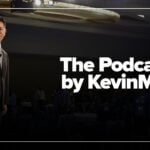Ten years. That’s how long I carried around this idea I just couldn’t seem to put into action. I wanted to speak openly about this tension I felt as both an academician and an ordained minister. Yes, this false notion that my academic life and my spiritual life had to run on separate tracks. Not only did I want to openly discuss this tension; I wanted to do something about it. I wanted to bridge the gap. The question then became, of course, how?
I frequently use educational theories and methods right alongside Scriptures in my sermons. My dad, after hearing one such discourse, proudly proclaimed, “This needs to be on TV.” I just smiled. I guess the TV aspiration was too much of a giant leap for me, so here’s what I did. I reached out to a local radio station in 2015, gathered all the information I needed, and outlined what the radio show would look like for bridging this false divide.
What happened next? Nothing. Unfortunately, I let the idea just sit like an old book on a shelf gathering more dust with each passing day. Fast forward to 2023, a year that turned out to be the most stressful of the past three years (data from my wearable device proves that). In the early morning of October 27, 2023, after 10 years of delaying and overthinking this idea, my dear father passed away.
Through many days of critical self-reflection, I had to face the truth: This delay was not about perfectionism. It was not about me lacking motivation or self-confidence. It was about that four-letter word called F-E-A-R. Fear of how my colleagues would respond. Fear of how my church family would react. Fear of stepping into a space that many try to keep separate, at least publicly. That space where faith meets academia; one where scholarship and spirituality meet explicitly and unapologetically.
Fear sometimes disguises itself as logical reasoning. I’m talking about those self-defeating thoughts like, “It’s not the right time,” “I don’t have the bandwidth,” or “What if this isn’t well received?” But the truth is, fear only produces more delay, and delay leads to loss of impact. Losing my dad was a key turning point that propelled me into action. I realized that another decade of waiting would only mean another decade of missing out on making an impact in the world. I realized that people aren’t waiting for polished, perfect delivery. They’re waiting for authenticity. They’re waiting for someone to speak into the tension they quietly feel; the tug-of-war between their faith life and their professional life.
In higher education, faith is often seen as something private, even unscientific. In faith-based communities, academic concepts and frameworks are sometimes dismissed as too worldly or abstract. And here’s where I found myself stuck, caught in this false dichotomy: feeling like I had to choose one over the other. In my view, faith and academia were never meant to be in competition. And medicine? It was never meant to stand apart from faith. Don’t forget that Luke, Paul’s trusted companion and author of two of the four Gospels, was the “beloved physician” (Colossians 4:14).
As a certified learning coach in medical education, I see how self-doubt sneaks into the lives of medical students. I hear it in statements like, “I’ve always been a terrible test-taker” or, “What’s wrong with me? I can’t grasp concepts like my friends do.” In these moments, I reach for frameworks like Carol Dweck’s research on growth mindset or Mezirow’s theory of transformative learning to rebuild confidence and elevate self-awareness. On the spiritual side, I hear the reminder from Philippians 4:13: “I can do all things through Christ who strengthens me.” That’s when these two worlds of faith and academia merge: The theory helps me diagnose the mindset and prescribe practical, research-based strategies. The Scripture fuels me with the conviction that transformation is not only possible but expected.
No! I am not quoting Scriptures on campus, but let’s keep it real. Philippians 4:13 is like saying, “Hey! You got this.” To be fully transparent, when my own self-doubt creeps in, whether during a conference presentation or even right now as I am writing this article, that Scripture becomes my superpower.
Let’s be frank about this. You can put in sixty hours a week in your department, publishing peer-reviewed articles, coaching or mentoring students, and still feel unfulfilled. You can lead in ministry, pour into others, and still feel drained, running on empty. Where does this feeling come from? Let’s turn to Romans 8:28: “All things work together for good to them that love God.” The part we gloss over is the “together.” Many of us have “things” that are working (e.g., jobs, titles, projects, and speaking engagements), but they are not working “together.” The dissonance comes when the academic and the spiritual are compartmentalized. It’s like a car that needs alignment.
Integration isn’t just nice to have. It’s necessary for wholeness. It’s needed for balance. This isn’t just about my story. It’s about you reading this article right now who might be hiding your spirituality for fear of being dismissed. It’s about every believer who suppresses their academic identity in the four walls of their place of worship for fear of seeming unfaithful. We can choose a more mutually informing path. Faith can give depth and direction to scholarship. Scholarship can give structure and clarity to faith. Together, they can prevent the burnout and disillusionment that so many of us face when we treat work and calling as separate entities.
For me, the integration of faith and academia is no longer optional; it’s essential. My day job isn’t just an academic exercise; it’s my calling. And my ministry isn’t just the continuation of a tradition. It’s enriched by the science of learning. Colossians 3:23 says, “Whatever you do, do it heartily, as to the Lord, and not unto men.” For me, that includes conducting research, coaching students, writing articles, developing curricula, and inspiring faith, hope, and service through the preaching and teaching of timeless biblical principles.
Faith and scholarship don’t just coexist. They work together. And when they do, the result is both personal fulfillment and a wider impact on our learners, colleagues, and on the communities we serve.
Adrian Reynolds is the founding director of the Office of Academic Enrichment and assistant professor of professional practice in the Department of Medical Education at the University of Miami Miller School of Medicine. With over two decades of teaching and academic coaching experience, he specializes in the applied learning sciences, integrating socio-cognitive and sociocultural approaches to support learners across the educational continuum. Since 2016, he has conducted more than 1,000 one-on-one academic coaching sessions with medical students, residents, and fellows, while also launching high-impact academic support programs and developing science of learning courses for learners from high school to graduate levels. His scholarship, published in journals such as Medical Teacher (2020) and Clinical Teacher (2022), focuses on building adaptive learning skills through personalized academic coaching. More recently, he has incorporated large language models into coaching to enhance goal attainment, academic achievement, and well-being. More of his work can be found on his podcast and LinkedIn.






















![AI censorship threatens the lifeline of caregiver support [PODCAST]](https://kevinmd.com/wp-content/uploads/Design-2-190x100.jpg)
